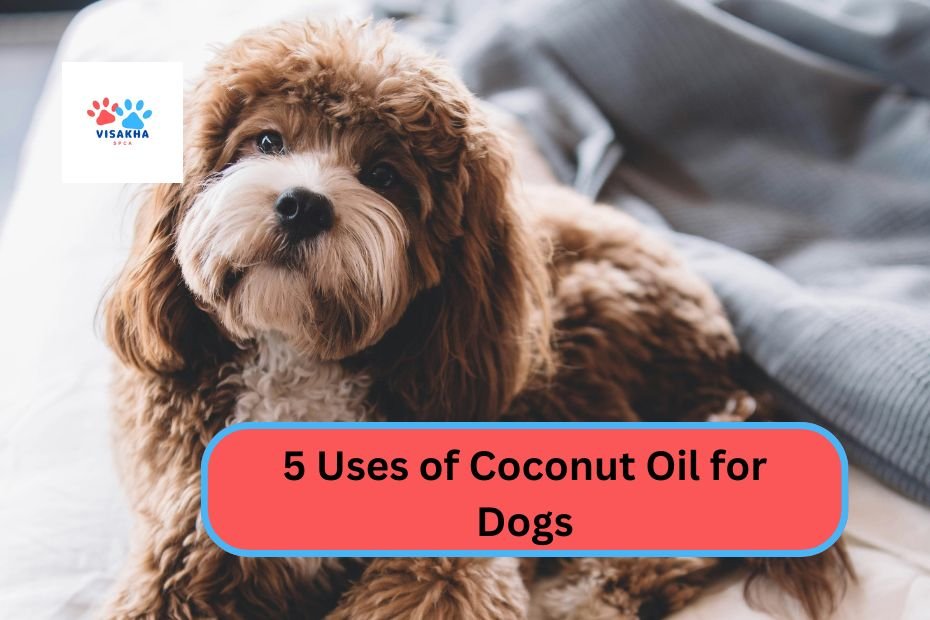Coconut oil is a versatile and natural remedy with numerous benefits for both humans and pets. Packed with essential fatty acids, antioxidants, and anti-inflammatory properties, coconut oil can support your dog’s health in a variety of ways. From improving their skin to aiding digestion, here are five effective uses of coconut oil for dogs.
1. Promotes Healthy Skin and Coat
Coconut oil is an excellent moisturizer for your dog’s skin and fur. If your dog suffers from dry, flaky skin or an irritated coat, applying coconut oil topically can help soothe the skin and add moisture. The oil is easily absorbed, leaving your dog’s coat shiny, soft, and healthy.
- How to use: Rub a small amount of coconut oil between your hands and massage it directly into your dog’s coat and skin. Let it sit for about 5-10 minutes before rinsing it out, or leave it in for longer periods for deep conditioning.
- Bonus Tip: You can also add a teaspoon of coconut oil to your dog’s food, which helps nourish the skin from the inside out.
2. Aids in Digestion
Coconut oil can improve digestion for dogs, particularly those who suffer from digestive issues like irritable bowel syndrome (IBS), gas, or bloating. The medium-chain triglycerides (MCTs) in coconut oil help balance gut bacteria and promote the absorption of essential nutrients.
- How to use: Start by adding 1/4 teaspoon of coconut oil to your dog’s food, gradually increasing the amount based on their size and tolerance. Monitor your dog’s digestion to ensure they handle the oil well.
- Note: Always introduce coconut oil into your dog’s diet slowly to avoid any digestive upset.
3. Boosts the Immune System
Coconut oil contains lauric acid, a powerful compound with antibacterial, antifungal, and antiviral properties. These qualities can help strengthen your dog’s immune system, making them more resistant to infections and illnesses.
- How to use: Add a small amount (1/4 to 1 teaspoon, depending on the size of your dog) to their food to help support their immune system. Regular consumption of coconut oil can help your dog fight off infections more effectively.
- Tip: Consistent use of coconut oil may also help reduce the frequency of colds, allergies, and other common infections in dogs.
4. Helps with Weight Management
Despite being an oil, coconut oil can actually assist with weight management in dogs. The MCTs in coconut oil are easily metabolized by the body, providing a quick energy boost without leading to fat storage. This makes it a good addition to the diet of overweight or sedentary dogs.
- How to use: Add 1/4 to 1 teaspoon of coconut oil to your dog’s food to help increase metabolism and energy levels. However, make sure to adjust portion sizes accordingly to avoid overfeeding.
- Caution: While coconut oil can promote weight loss, it should be used in moderation, as too much fat can lead to weight gain if not carefully balanced with your dog’s overall diet.
5. Relieves Itching and Hot Spots
Dogs prone to itching, hot spots, or allergic reactions can benefit from coconut oil’s anti-inflammatory properties. Coconut oil provides soothing relief from itchy skin and can reduce inflammation and redness caused by hot spots or allergic reactions.
- How to use: Apply a small amount of coconut oil to the affected areas on your dog’s skin. You can reapply as needed until the irritation subsides. Coconut oil forms a protective layer on the skin, preventing your dog from excessive scratching or licking.
- Tip: Make sure to clean the area before applying coconut oil to avoid trapping dirt or bacteria under the oil.
Conclusion
Coconut oil offers numerous health benefits for dogs, from improving skin health and digestion to boosting the immune system and aiding in weight management. When using coconut oil for your dog, start with small amounts and adjust based on their size, tolerance, and health needs. Always consult your veterinarian before adding new supplements or treatments to your dog’s routine to ensure it aligns with their specific health condition.

